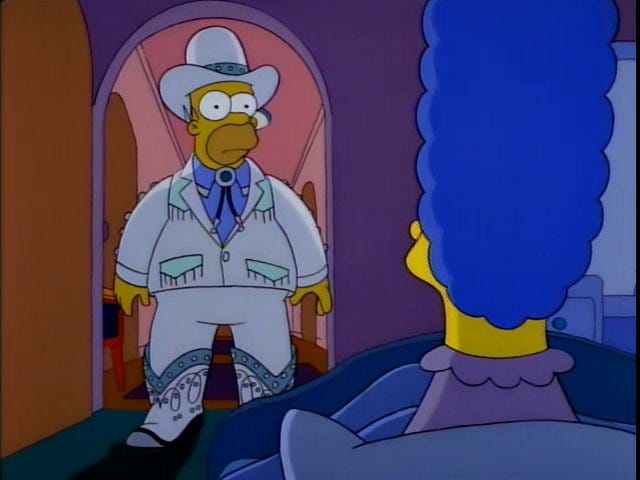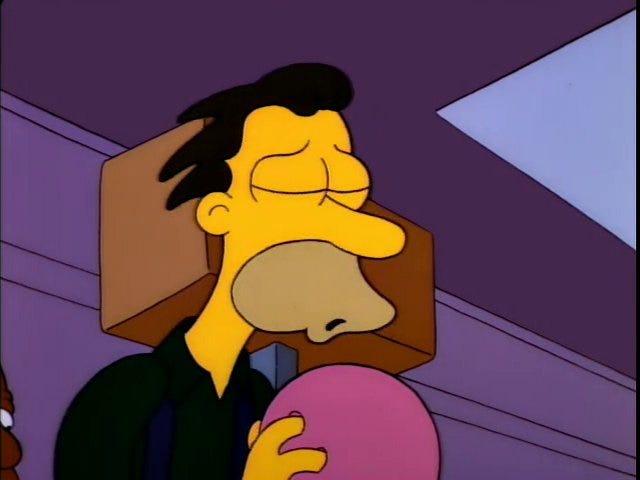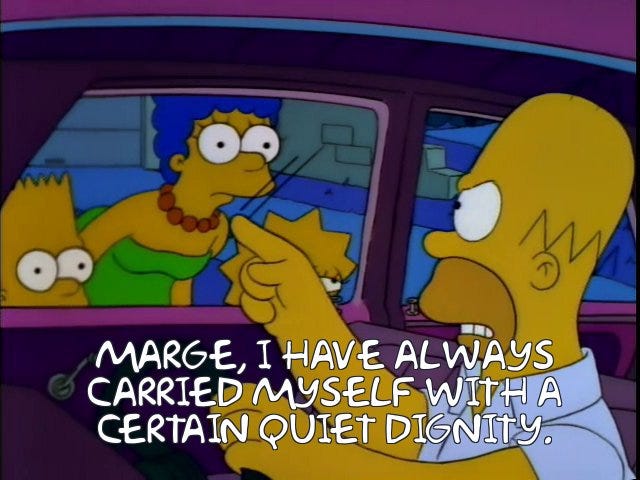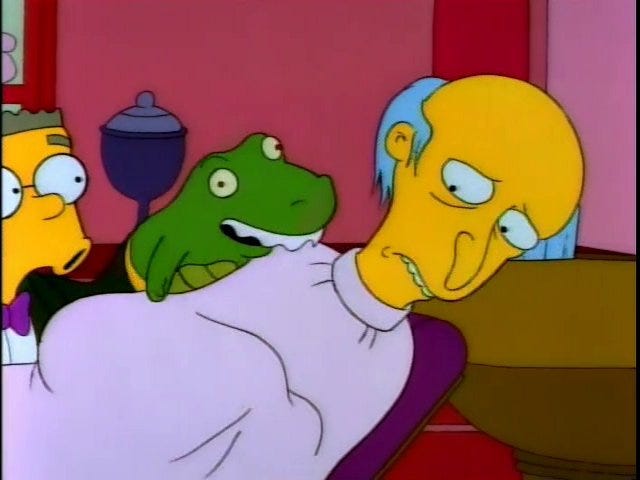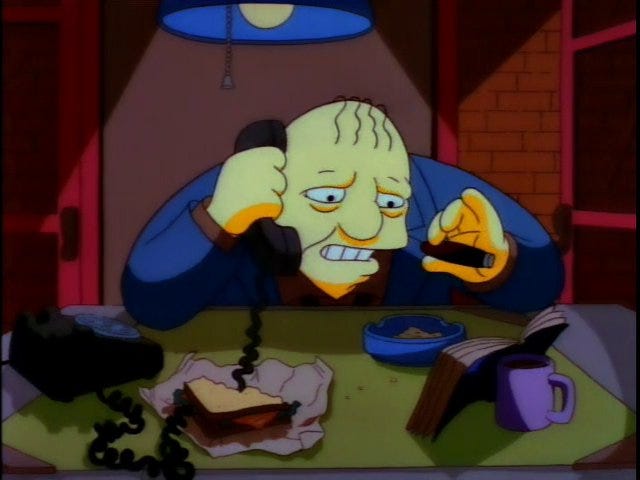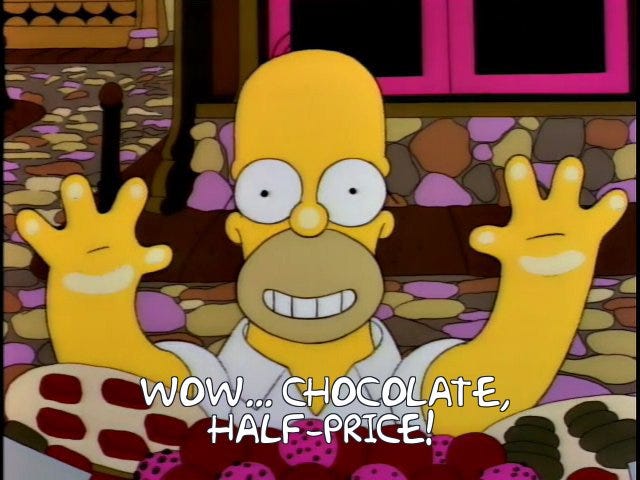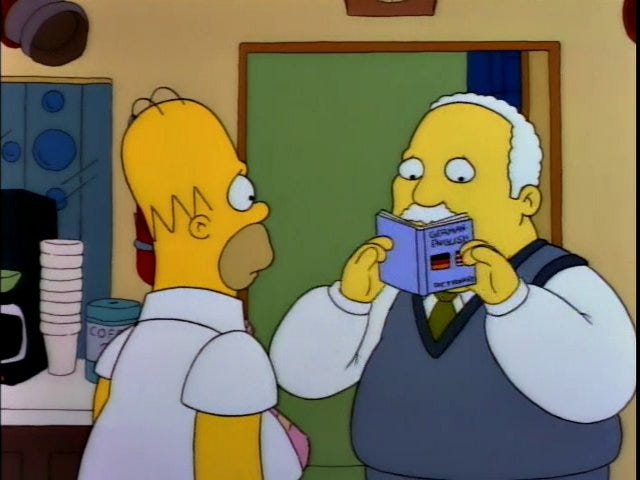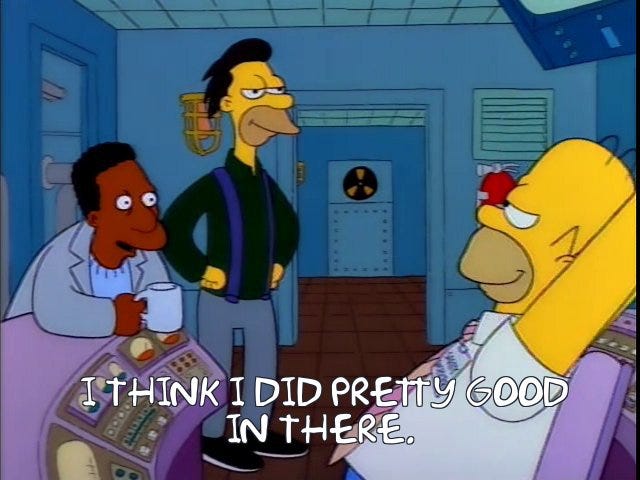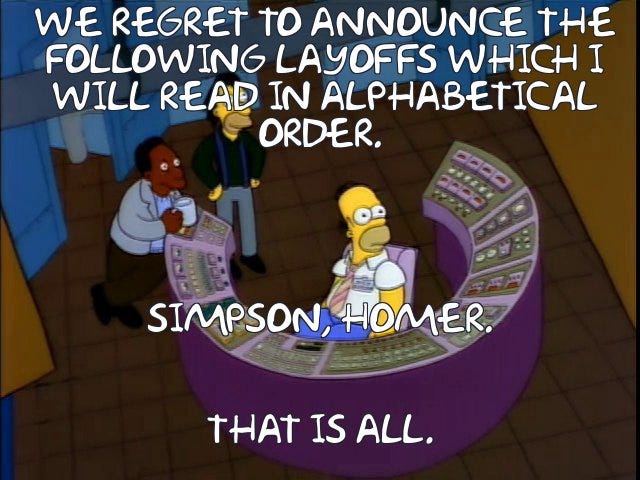There are 24 episodes in Season Three of The Simpsons. In this post, you’ll first find the CLASSIC Scale episode score for each, listed from best to worst. Then, the season’s cumulative results. Finally, some commentary on the season’s best episodes, some thoughts on Homer, and some considerations about how to evaluate the season’s disgraced premiere, Stark Raving Dad.
I explain my method here. This is the master document, containing my up-to-date all-time rankings list.
Excellent (A)
Homer at the Bat
Colonel Homer
Burns Verkaufen der Kraftwerk
Great (A-)
Stark Raving Dad
Flaming Moe’s
Lisa’s Pony
Bart’s Friend Falls in Love
Bart the Lover
Separate Vocations
I Married Marge
Saturdays of Thunder
Dog of Death
Brother, Can You Spare Two Dimes
Very Good (B+)
Homer Alone
Lisa Goes to Washington
Homer Defined
Black Widower
When Flanders Failed
Radio Bart
Bart the Murderer
Good (B)
Lisa the Greek: 7.68
Treehouse of Horror II: 7.54
The Otto Show: 7.43
Like Father, Like Clown: 7.36
Season Three Rankings
Average Category Score:
(from S2 → S3)
Characters: 7.57 → 8.11 (+0.54)
Laughs: 7.25 → 7.93 (+0.68)
Artistry: 7.59 → 8.19 (+0.60)
Story: 7.38 → 8.01 (+0.63)
Setting: 7.40 → 7.97 (+ 0.57)
Irreverence: 7.17 → 7.84 (+ 0.67)
Classic-ness: 7.43 → 8.07 (+0.64)
Average Episode Score: A-
As far as the CLASSIC scale, each category gathers around Greatness in Season 3. Statistically, each category takes a substantial step from “Good” to “Great,” and those glimpses of Greatness that really started to show through in the show’s second season finally find consistency. The other evolution? The show achieves categorical Excellence with far more regularity than any other season, and achieves an Excellent score for three episodes.
→ There are more “Great” episodes than any other classification (10), with “Very Good” coming in at a close second
→ There are almost as many “Excellent” episodes (3) than those which are merely “Good” (4)
→ There are zero (0) episodes that score worse than “Good”
Pretty impressive growth. In Season Three, there’s an undeniable magic that often shines through. If current trends continue through seasons 4-5-6, the show is on its way to establish its standard as something better than Greatness. But for now, let’s take a look at the best episodes of the best season yet.
Beyond Great: Three Episodes That Achieve Excellence
Homer at the Bat has always earned more-or-less universal praise from critics and fans alike. I’m not surprised that it’s the CLASSIC scale’s favourite episode yet. The massive cast of guest stars is impeccably managed: Griffey’s gigantism, Mattingly’s sideburns, Darryl Strawberry’s single tear, and so on. The Simpsons team pulls out a strong performance from all nine ball players (not an easy task, they’re athletes) and each of their little arcs within the episode succeeds. Mr. Burns has a standout episode, too. And we see Homer at his best, at his most pathetic, and at that beautiful middle-ground where his natural stupidity ends up contributing to his triumph.
Colonel Homer introduces journeys through an emotional arc, delivers high-end artistry (clever animation sequences, legitimately catchy country tunes backed with a killer honky-tonk band), and introduces all sorts of interesting world-expansion with Spittle county and its hillbilly cast of characters. But most of all, it’s extremely funny. There’s a healthy supply of hilarious throwaways, from “Forget it, pal! They don’t call me Colonel Homer because I’m some dumb-ass army guy,” to Lenny singing to his bowling ball.
Colonel Homer also features one of my favourite lines of all time:
I love this line and I think it’s worth questioning whether there’s a grain of truth to it. Obviously, neither “quiet” nor “dignity” are words that come to mind when we think Homer Simpson. But is there an integrity to Homer in these early episodes that eventually fades away? Sure, he’s a stupid, abusive, out-of-shape man-child. But sometimes his natural disposition meets the world in such a way that, flukily, he’s pretty good at things. We’ve seen him excel as: a softball player, baseball mascot, country music manager, cocktail inventor, and occasional nuclear-meltdown-saver. Sometimes, he even realizes his error-ridden ways and finds a way to be a good dad or husband for an act or two of a single episode. Could that have something to do with his self-image being one of quiet dignity? That he often manages to come through, not in spite of himself, but because of himself? Season Three sees Homer become the character we love in a way Season Two sometimes captured and Season One never even approached. It goes without saying that one of the most interesting parts of my project here will be tracking the progression of Homer. In doing so, I’ll be keeping this in mind, seeing whether and how this quiet dignity still finds ways to re-appear, or whether it eventually fades for good.
Finally, there’s one episode that kind of surprised me with its placement in the “Excellent” category: Burns Verkaufen der Kraftwerk. The episode begins with an uncommon glimpse into the emotional life of Burns. Smithers dons a “Snappy the Alligator” puppet, allowing the old man to come to his decision to sell the plant.
The Burns we get in Season Three is still developing the oddball tendencies and physical decrepitude that he eventually lands on, but this is one of those scenes that establishes him as more than just a mean, rich boss. Then, we get a glimpse into the dreary world of a total one-off character: Homer’s stockbroker…
Uncritically following this sick, sketchy man’s advice, Homer prematurely sells his company stock for $25, which is mostly blown on beer from Henry K. Duff’s Private Reserve. A moment of utter devastation comes from this, when Marge and the family realize Homer’s pissed away their chance at a $5200 “miracle we’ve been waiting for.” I hadn’t seen this full episode in a while, and this is all brilliantly written; it actually made my stomach sink to see Homer completely obliterate the hope of his wife and kids. In the aftermath of Homer’s fail, little details help this episode separate itself from the pack. Lenny’s plastic surgery brings lots of laughs. Smithers’ set of “Sycophantic German” tapes is perfect. And of course, Homer’s “Land of Chocolate” fantasy stands out in Simpsons history as one of the silliest, best-executed, and most joyful adventures into imagination the show ever gives us. It’s a perfect sequence with a perfect punchline:
The extravagance of this bit may cause us to forget how smart it is. First of all, it all comes up through Homer’s proposal to make the candy machines accept beat-up dollar bills, which was what we saw him struggle with in his first scene of the episode. More immediately, the exchanges between Homer and his new German managers leading up to this moment is so good:
- Homer, could we have a word with you?
- No.
- I must have phrased that badly. My English is inelegant. I meant to say... may we have a brief, friendly chat?
- No!
- Once again, I have failed. ''We request the pleasure of your company... for free exchange of ideas.''
- Nooo!
The “brief, friendly chat” lands some hilarious moments on the way to the Land of Chocolate, and the return back to reality is just as funny.
In a mere 7 minutes or so, Act III ties up a lot of loose ends somewhat sloppily, but every step along the way features comedy gold. I don’t toss out 9s lightly, but this episode got there for both Laughs and Artistry. Upon re-re-watching the episode, those scores are completely justified, and help carry this episode to its even 8.50 score.
Final Thought
Without the deeply discomforting air of Michael Jackson surrounding it, the original season premiere of Season Three, Stark Raving Dad, would find itself in the “Excellent” category. As of now, I’ve found it difficult to determine whether being the only episode to be removed from the show’s official canon by its (evil) rights-holder is something that adds to- or detracts from- its “Classic-ness” status. I veered on the side of detracts from, but that’s far from a settled decision.
The episode earned a score of at least “Excellent” in Irreverence, Artistry, Setting, Story, and Laughs. On its own merits, Stark Raving Dad definitely among the funniest episodes of the season. It’s beautiful, moving, hilarious, smart. But whether you are comfortable enough with Jackson’s legacy or not to enjoy the episode or not will be entirely up to your own perspective. If you are a newer Simpsons-head who has never seen the episode, it is worth asking yourself where you think you stand on it. On purely aesthetic terms: it’s an absolute banger. But the presence of Michael Jackson absolutely contributes to that, and it’d be disingenuous to pretend otherwise.
So, on moral terms: if you have trouble dancing to Billie Jean when the wedding DJ turns it on, you’ll likely have trouble enjoying this episode, too— and, if you don’t, you probably won’t. Whether the moral and aesthetic can be neatly separated in this way? Still something I’m working out, and I’m open to perspectives and opinions as to how to evaluate the original S3, E1.





